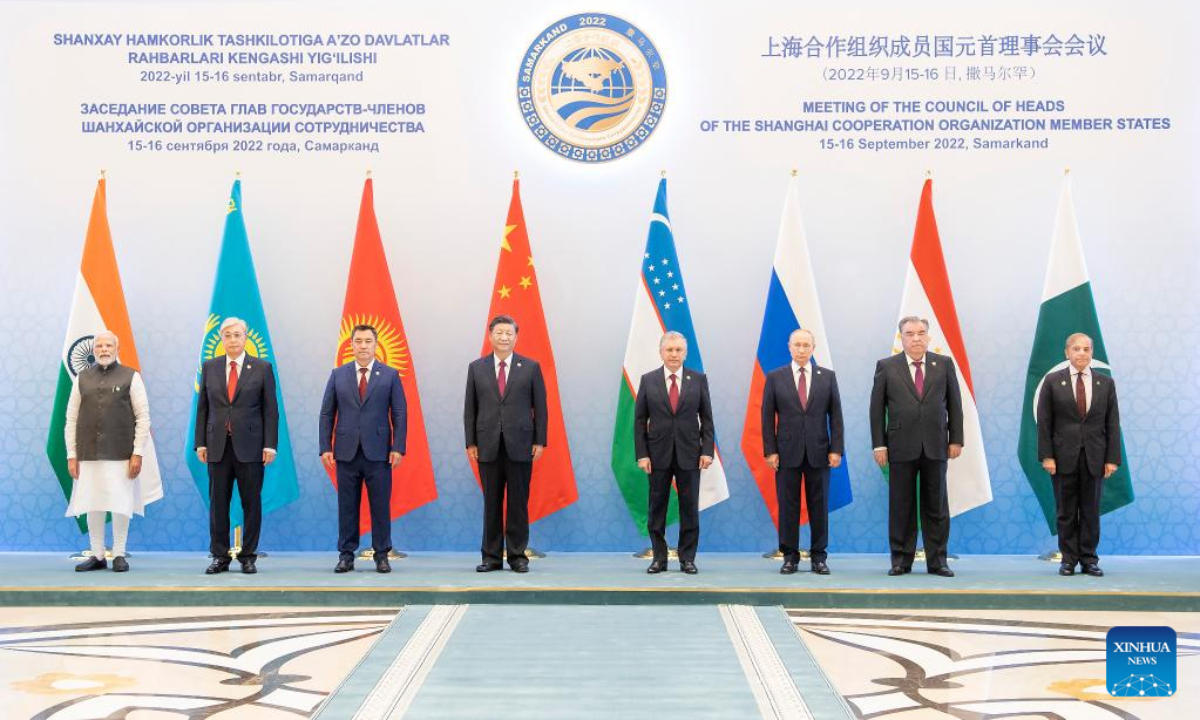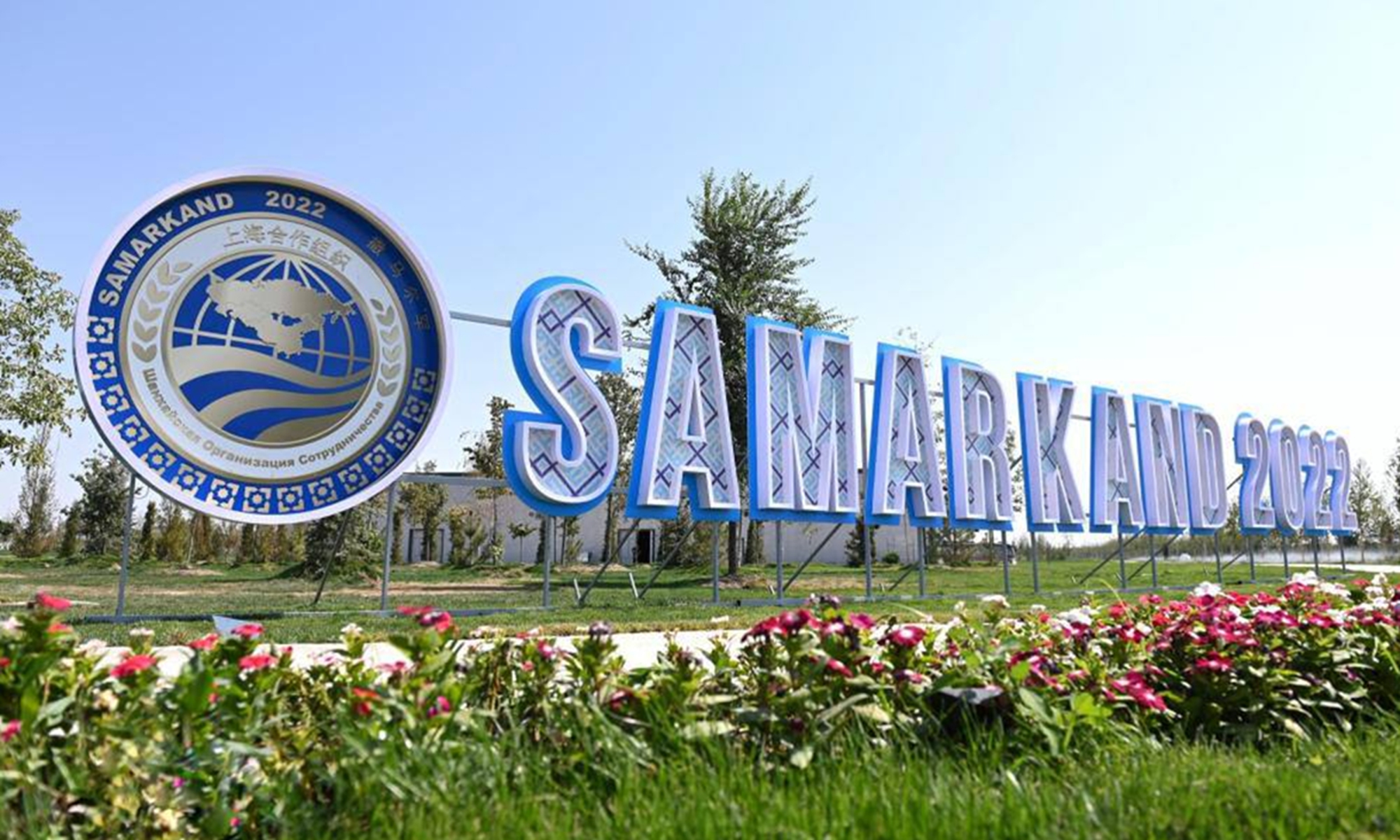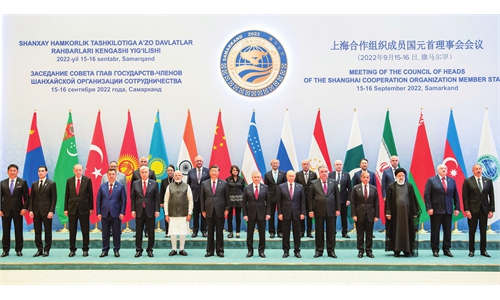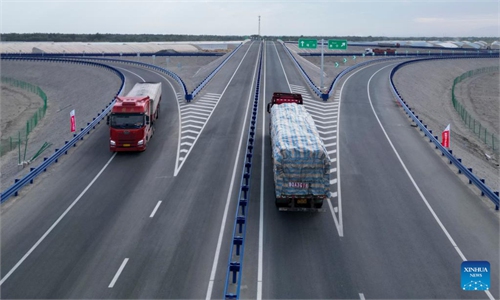IN-DEPTH / DIPLOMATIC CHANNEL
China to play important role in further development of SCO: former Uzbek deputy prime minister

Chinese President Xi Jinping poses for a group photo with other leaders of the Shanghai Cooperation Organization (SCO) member states before the restricted session of the 22nd meeting of the Council of Heads of State of the SCO at the International Conference Center in Samarkand, Uzbekistan, Sep 16, 2022. Xi attended the restricted session on Friday. Photo:Xinhua
The role of China as one of the founding members of the Shanghai Cooperation Organization (SCO) is enormous in its formation and further development and it continues to be the leading factor in facilitating economic and trade cooperation within the SCO, former Uzbek deputy prime minister and former minister of foreign affairs of Uzbekistan Saidkasimov Saidmukhtar told the Global Times in an exclusive interview.Saidkasimov said that the just-concluded 22nd meeting of the Council of Heads of State of the SCO was successful and productive.
Saidkasimov Saidmukhtar Photo: Courtesy of Saidkasimov
Uzbekistan chaired the SCO summit this year in Samarkand. The event, which took place from September 15-16, attracted worldwide attention, as it was one of the most prominent events held in Central Asia with the participation of many world leaders. The summit was a great success for the new open and constructive foreign policy of the President of Uzbekistan Sh.Mirziyoyev."The significance of the Samarkand summit was also determined by the fact that the total territory of the SCO countries occupies about 40 percent of the world, in which one third of humanity now lives. Their share is more than a quarter of world GDP, while their economic growth rates are much higher than global indicators," said Saidkasimov.
According to the former deputy prime minister, Uzbekistan's chairmanship of the SCO has come during a very tense period, with a lot of complex political and socio-economic upheavals.
"A long-awaited practical need has arisen for the SCO countries to engage in direct communication for detailed discussion of the most acute, topical problems, primarily in the areas of socio-economic development, both for each country and for the entire organization. Now it is clear to everyone that no country will be able to avoid new global challenges and cope with them alone," he said.
Despite the difficulties caused by the COVID-19 pandemic, the outlined plans for Uzbekistan's chairmanship of the SCO were implemented in full and more than 80 major international events were held with the active participation of representatives of the organization, he added.
The main outcome document of the summit was the Samarkand Declaration of the Council of Heads of State of the SCO. Also, a record number of statements and documents addressing global food security, international energy security and climate change as well as maintaining a secure, stable and diversified supply chain have been released.
The world today is undergoing global changes and has entered a new period of rapid development and major transformation, with the trend toward a multi-polar world intensifying, countries becoming increasingly interdependent, and informatization and digitalization accelerating, said the declaration.
Meanwhile, the current international challenges and threats are becoming more complex, the international situation is deteriorating, and regional conflicts and crises keep emerging and escalating, it read.
Saidkasimov told the Global Times that it is no coincidence that in the two days of the summit, Samarkand was the main center of world politics. The summit first of all reflected the most important thing, which is that the SCO countries proceed from the fact that only effective international cooperation, free from geopolitical rivalry, ideological contradictions and political disputes, can make the world more stable, predictable and prosperous.
He noted that China plays an important role in facilitating economic and trade cooperation in the SCO.
In 2021, China's trade with other SCO members reached $343.1 billion, up 40 percent year-on-year. SCO members' total foreign trade reached $6.6 trillion in 2021, an increase of 100 times from 20 years earlier.
As one of the latest results of SCO economic cooperation, the China Development Bank (CDB) said that it had completed 63 cooperation projects under the framework of the SCO Interbank Consortium, extending loans totaling $14.6 billion to member banks and partner banks by August, covering production capacity cooperation, infrastructure, green and low-carbon development, and agriculture.
"These and many other facts testify to the significant role of China in the further development of this international organization," he said.
Growing attractiveness
At the summit this year, a memorandum of obligations on Iran's SCO membership was signed.
Many other countries have also reportedly expressed strong interest in joining and close cooperation with the SCO.
Talking about why the SCO is appealing to so many countries, Saidkasimov said international cooperation "that meets the interests of everyone is impossible to develop without multilateral institutions." These institutions "serve as the most important conductors of interstate interaction - at the regional and global levels - helping countries to overcome differences and strengthen mutual understanding, develop political and economic cooperation, expand trade and stimulate cultural and humanitarian exchanges," he said.
"These are the goals and objectives pursued by the SCO, which, in fact, is a unique interstate structure that has managed to unite countries with different cultural and civilization characteristics, foreign policy guidelines and models of national development," Saidkasimov noted. "In a short historical period, the SCO has come a long way, to represent an integral element of the modern global political and economic world order."
The key to the international attractiveness of the SCO is its non-bloc status, openness, non-direction against third countries or international organizations, equality and respect for the sovereignty of all participants, refusal to interfere in internal affairs, and prevention of political confrontation and confrontational rivalry, he said. All the activities of the SCO are focused on promoting multilateral cooperation through ensuring regional security and economic growth based on the principles of consensus, equality and mutual respect.
"The SCO has become an influential participant in regional and global processes, a pole of attraction without dividing lines in the name of peace, cooperation and progress," he said.
Analysts pointed out that there is also vast potential as well as growing urgency for economic and trade cooperation among the member states and other partners as the global economy faces multiple challenges.
"In a world with new challenges and opportunities, the SCO has excellent prospects for transformation and growth, not only through quantitative replenishment, but also through the opening of new strategic sectors," he said.

A signboard of the SCO Samarkand Summit is seen in Samarkand, Uzbekistan. Photo: Courtesy of Embassy of Uzbekistan in China
Not a military allianceSaidkasimov told the Global Times that it should be noted that the SCO and NATO are completely incomparable organizations. NATO is an openly military-political bloc of states for the purpose of joint defensive or offensive actions. Each member of NATO is required to maintain targeted spending in this area of at least 2 percent of their GDP.
As for the SCO, from the very beginning of its creation it did not have a military component, military structure or defense duties, strictly maintaining its non-bloc status and openness.
"As it is again specifically emphasized in the Samarkand Declaration, the member states, in accordance with the principles of the SCO Charter, adhere to a principle that excludes bloc, ideological and confrontational approaches to solving problems of international and regional development, countering traditional and non-traditional challenges and security threats while confirming the principle of interaction in constructing a new type of international relations in the spirit of mutual respect, fairness, equality and mutual benefit," he said.
Despite stark differences between the SCO and NATO, some Western media outlets said that the SCO is becoming a possible counterbalance to NATO, and Western dominance in general.
Saidkasimov said that indeed, in certain political centers of the West, a panicky idea is being formed that the SCO is becoming an alliance against the Western world and Western values. A number of his Western colleagues including politicians and experts often adhere to such positions.
"But this is an absolutely wrong interpretation of the very essence of the functioning of the SCO, because it sets other, primarily socio-economic and humanitarian goals, as we have already mentioned.
"The SCO has a firm commitment to the principles of openness and non-alignment. It strengthens and successfully expands mutually beneficial economic, trade, communication and logistical relations as well as international cooperation both between the member states of the organization and with all interested countries," he said.


